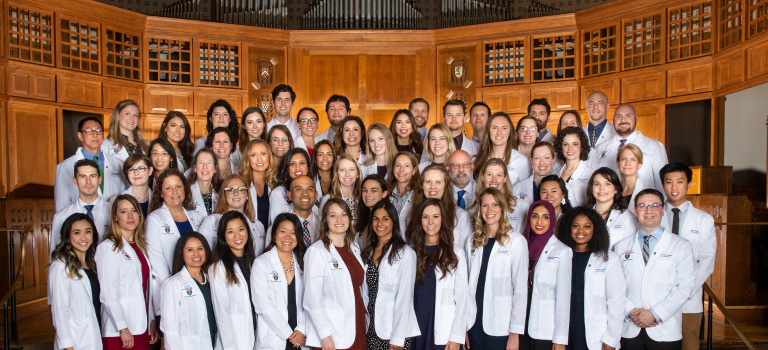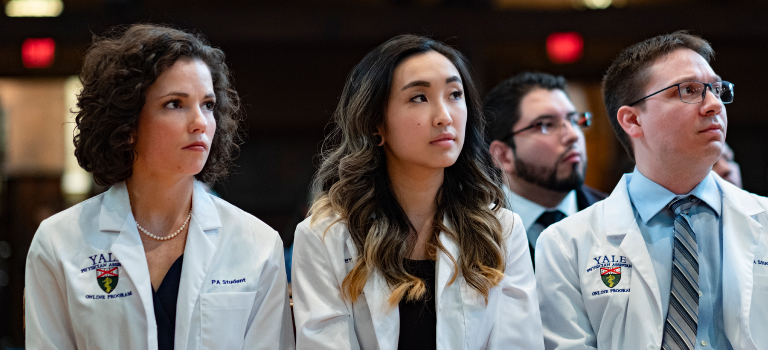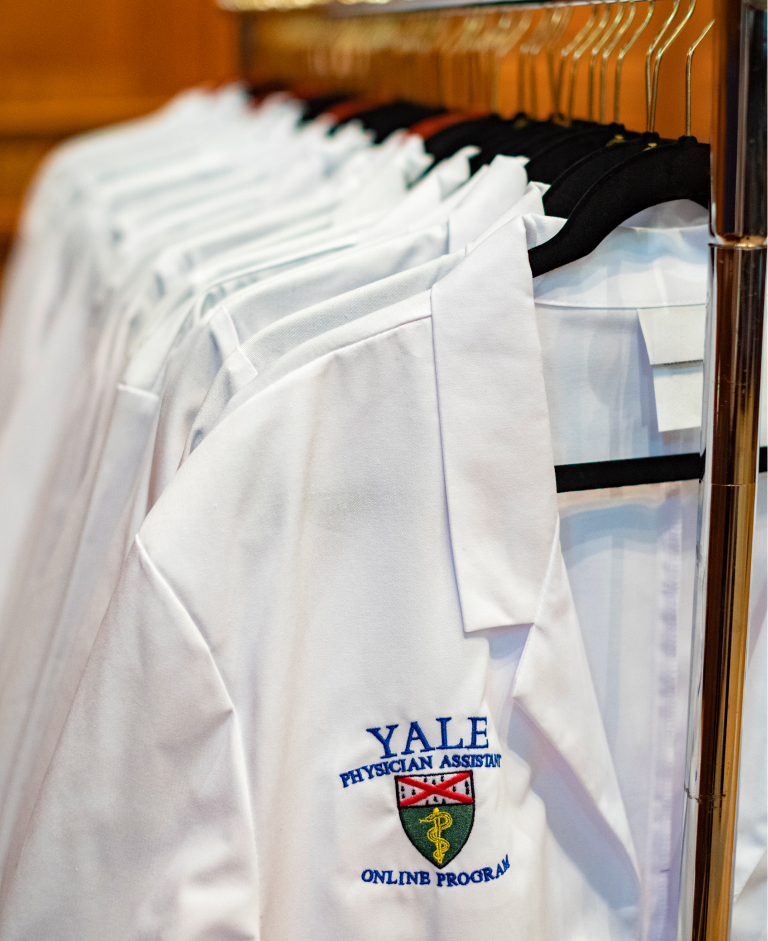Yale PA Online Class of 2021: White Coat Ceremony

Fifty-seven white coats hung neatly on a rack on the stage in Battell Chapel on the Yale University campus. Sun shone through the chapel’s stained glass windows and the buzz of conversation among guests filled the large space in anticipation of the March 15, 2019, White Coat Ceremony for the second cohort of Yale School of Medicine (YSM) Physician Assistant (PA) Online Program students. At 2:00 pm, the room grew silent as Yale PA Online Program Director James Van Rhee MS, PA-C welcomed everyone to the gathering, including many proud and supportive family members and friends.
“The white coat is a reminder to balance excellence in the sciences with compassionate patient care.”
Before March 10, the PA Online students only had engaged with each other and faculty through highly interactive online classes. But after spending a week together on the Yale campus during their first Campus Immersion—with learning experiences including the anatomy lab and clinical skills practice—the students and faculty exuded comradery at the White Coat Ceremony, the final event of Immersion I.
In his opening remarks, Van Rhee told the students, “the white coat is a reminder to balance excellence in the sciences with compassionate patient care.” The White Coat Ceremony traditionally reflects when PA or MD students transition from dedicated classroom learning to hands-on clinical care training. The PA Online ceremony took place on March 15 because in late March the students begin their Clinical Experience in the Early Didactic (CEED). Through CEED, the students will spend four to six hours each week under the guidance of a preceptor, seeing patients, while continuing their didactic training.
A message from Dean Belitsky: “You do not have to be perfect to be a great PA”

In his keynote, Richard Belitsky, MD, deputy dean for education and associate professor of psychiatry, reflected on his own insecurities during medical training. He surmised that some students might be thinking “Do I belong? Am I smart enough? Can I be a great PA?” He reassured them that though they have a lot to learn, “the most important things you need to be a great PA you already have in you. Compassion, concern, the ability to form caring, trusting relationships with patients.” Being a great PA, he noted “starts not with what you know, but with who you are.”
Belitsky shared another lesson he learned over time: “You don’t have to be perfect.” He illustrated this point by engaging the audience in reminiscing about three television doctors he grew up watching: Dr. James Kildare, Dr. Ben Casey, and Dr. Marcus Welby. He humorously noted that when he was younger he wanted to be handsome like Kildare, smart like Casey, and compassionate like Welby, to make the point that no one has it all. “You do not have to be perfect to be a great PA,” he reminded students.
Another lesson learned he shared was to remember the phrase “you’re a PA, of course you feel this way.” He told about how when he was training, he had to pull bandages off a little boy in a burn unit. The boy turned to Belitsky and asked “if you are my doctor, why are you hurting me?” At the time, Belitsky cried in response, and his attending physician told him “if you are going to be someone’s doctor, you can’t let yourself feel this way.” Belitsky told the PAs that he wished his attending had given him different advice, reminding them that all medical professionals feel strong emotions like this sometimes, and “it turns out that the things that make this work hard are the things that also make it meaningful and fulfilling.”
“The most important things you need to be a great PA you already have in you. Compassion, concern, the ability to form caring, trusting relationships with patients.”
Belitsky closed with three phrases he encouraged PAs to use often in their careers. First, “I’m sorry,” noting things will go wrong at times and when they do, starting with I’m sorry, and following with “I’ll try to do better next time” can preserve a lot of trust in your relationships with patients. Second, “I don’t know,” pointing out that there are so many things in medicine we don’t know, and the important thing is to know the limits of your knowledge, coupled with an offer to find out more. Third, “Tell me more,” a go-to phrase that emphasizes your curiosity and deepens your connection with patients.
As the ceremony was about to shift to each student receiving a white coat, Belitsky reminded them that what will make them a great PA is not the tools that will fill their pockets like stethoscopes and pen lights, “but what’s inside the coat.”
Receiving the white coat

The 57 students then went onto the stage one by one to receive their white coats. The four Yale PA Online faculty who lead student cohorts, Jane McDaniel, MS, MLS(ASCP), SC, lecturer and director of admissions; Stephanie Neary, MPA, MMSc, PA-C, instructor and didactic coordinator; Mary Showstark, MS, PA-C, instructor; and Van Rhee, each presented their advisees with their white coats.
Douglas Berv, ’74MD, representing the YSM Alumni Association, then presented each student with the YSM crest, which is traditionally worn by the students on their white coat. The crest is meant to serve as a reminder that they are student ambassadors of YSM today, and will maintain close ties to Yale as graduates in the future, representing and connecting Yale across the country.
There was much excitement and tears of joy from family members in the audience as students received their white coats and crests, including a few happy shouts of “mama” from a child in the audience seeing his mother receiving her white coat on stage. After receiving their white coats and crests, the students stood and, in unison, recited the Physician Assistant Professional Oath.
Van Rhee closed the ceremony reading a moving story written by a medical resident who threw his white coat away after he had not been able to save a 36-year-old patient, telling his own 36-year-old wife that “this one doesn’t work anymore.” Van Rhee emphasized that the white coat is much more than a ceremony. It symbolizes professionalism, power, and trust, noting that “when you wear it, patients will open up to you and trust that you will take care of them.”
Citation for this content: Yale School of Medicine Physician Assistant Online Program

